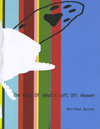The Best Of (What’s Left Of) Heaven
Thursday, January 01, 2004
Dammit more champagne.
Thursday, January 01, 2004
Dammit more champagne.
Friday, January 02, 2004
Dammit no more champagne.
So goes the opening poem in The Best of (What’s Left of) Heaven, Mairéad Byrne’s new collection which brings together in book form poems that were originally published on her blog, Heaven. The opening poem is part of the “calendar” section, which contains poems concerned with days, months, and seasons, and it sets the tone for the book, which ranges from light-hearted and funny to more serious and somber poems. However, they are all marked by cleverness and a spirit that seems to approach life with enthusiasm. Even when Byrne writes about daily routine and the mundane, the reader gets the sense that Byrne’s life is anything but routine or mundane. Take for example, “Learning to Ride the Bicycle of My Life”:
I’m doing it!
I’m doing it!
I’m doing it!
I’m doing it!
I’m doing it!
I’m doing it!
I’M DOING IT!!!
This repetition and playfulness marks a number of the poems throughout the collection, but this is a big collection of poems at over 200 pages, so picking out a couple of representational poems is a difficult task. Byrne disagrees with this assessment, however, in her poem “Donald Hall Would Hate Me,” where she claims her poems take ten minutes to write and that she has no interest in being great. She offers this take on her work:
My poems are usually brief
they resemble each other
they are anecdotal
they do not extend themselves
they make no great claims
they connect small things to other small things
In the closing couplet, Byrne concludes, “I just want to kick the leaves / & have done.”
The poems are arranged into sections based on theme. In addition to “calendar,” there is “everyday lunacy,” “found,” “interviews,” “numbers,” “war,” “family,” “poetry,” “providence,” “dedications,” “instructions,” “everything is unlikely,” and “everything else.” Besides the table of contents, the only demarcation of section change occurs in the bottom corner of the page, which nicely allows for the reader to pass from one section to the next without being interrupted.
There are so many noteworthy poems from this collection, whether for their humor – like in “Tip”: “Here is something I do when I have to get up: / I go back to sleep” – or for their anger like in the war poems. There are also a number of tender poems, like in the dedication “e-mail me” written for kari edwards. “Everything is Unlikely” captures the absurdity of it all – everything is unlikely, from simple tasks like eating and sleeping to the more incredible and horrible things that happen in our world. Byrne (who emigrated from Ireland to the U.S. in 1994) writes:
My whole life is unlikely. What is America? Why am I here? What happened to the other country? Where did my sisters’ houses go? Why am I here – in this house – in this world – which also holds a man screaming as other men saw at his neck with an inadequate knife?
This troubling image raises the questions: how is it possible to live in this world? How is it possible to go on? For Byrne, the answer seems to be to face the absurdity. To take it all in. To crank up the music (as she instructs in “Always the Right Thing to Do”). To live fully. And to laugh.





